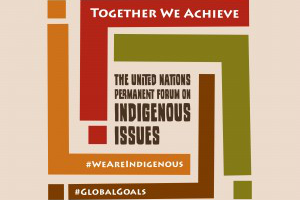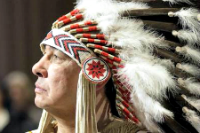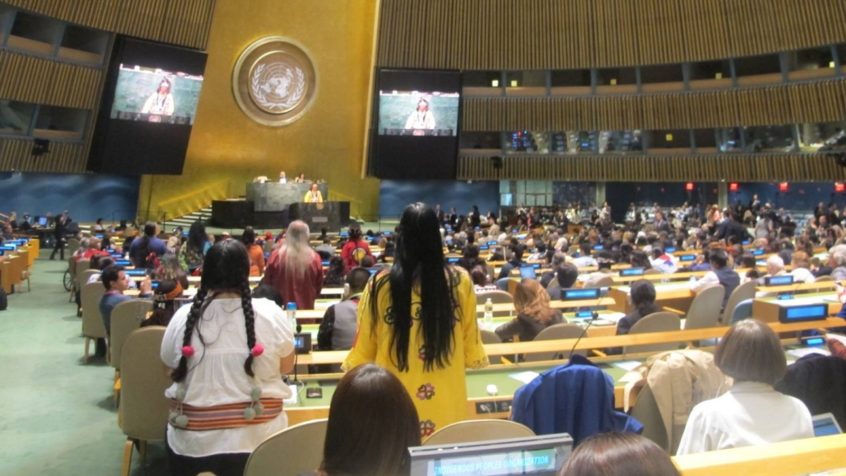 Joint Statement by:
Joint Statement by:
Chair of the UN Permanent Forum on Indigenous Issues, Mr. Álvaro Pop.
Special Rapporteur on the Rights of Indigenous Peoples, Ms. Victoria Tauli-Corpuz.
Chair of the Expert Mechanism on the Rights of Indigenous Peoples, Mr. Albert Barume.
13 September marks the anniversary of the adoption of the UN Declaration on the Rights of
Indigenous Peoples by the United Nations General Assembly in 2007.
The UN Declaration on the Rights of Indigenous Peoples is a historical achievement. It defines
the minimum standards necessary for the survival, dignity and well-being of indigenous peoples
around the world. Adopted by an overwhelming majority of Member States in September 2007,
and with the four countries that initially voted against having since then reversed their positions,
the Declaration reflects global consensus on indigenous peoples’ rights.
The UN Declaration is an important step forward for the recognition, promotion and protection
of the rights and freedoms of indigenous peoples. It recognises and reaffirms indigenous
peoples’ right to self-determination, and by virtue of that right, to freely determine their political
status and freely pursue their economic, social and cultural development.
The UN Declaration also institutionalises a dialogue-guided partnership and respect between
indigenous peoples and Member States. From the drafting to its adoption, indigenous peoples
and Member States worked side by side to achieve a common understanding and to achieve the
rights of indigenous peoples.
Following this successful partnership, in September 2014, the UN convened the first ever World
Conference on Indigenous Peoples, with an outcome document wherein Member States commit
to achieving the UN Declaration on the Rights of Indigenous Peoples. Among other concrete
steps to be taken by various stakeholders, the UN agreed a System Wide Action Plan on
indigenous peoples (SWAP) to operationalise the Declaration, including through national action
plans. We encourage agencies to intensify their efforts towards the implementation of the
Declaration. We also call on Member States to enable the participation of indigenous peoples’
representatives and institutions in meetings of relevant UN bodies on issues affecting them as
permanent observers. We emphasise the need for the continued involvement of indigenous
peoples’ representatives in decisions that affect them as well.
Although these results are promising, the progress we have seen is not enough. There is still
reluctance by some governments to recognise indigenous peoples and to redress historical
injustices. The failure of many states to recognise and protect the rights of indigenous peoples to
their lands, territories, and resources, and the violence they experience from state authorities
when they assert and claim these rights is unacceptable. Indigenous peoples continue to have
poorer access to education, higher rates of poverty and lower incomes. Many indigenous peoples
still face systematic discrimination and marginalisation, and their cultures, identities, livelihoods
and very existence are under threat. They cannot exercise and enjoy their basic rights and
fundamental freedoms. This is particularly acute for indigenous women.
There is a need for targeted concrete action to overcome these obstacles. We therefore urge
Member States to demonstrate the political will, technical capacity and financial commitment to
implement the UN Declaration as the minimum standard to ensure the survival, dignity and wellbeing
of the indigenous peoples of the world.
In September 2015, Member States adopted the 2030 Agenda for Sustainable Development with
17 goals to end poverty, protect the planet, and ensure prosperity for all. To meet the sustainable
development goals, indigenous peoples must be central to its implementation. We must also
make sure that development efforts have no negative impacts on indigenous peoples. Their
aspirations and visions for their self-determined development should be included and supported
to ensure that they will not be left behind. The importance of indicators which will be used to
measure how the SDGs are promoting indigenous peoples rights and development should not be
underestimated. Only by fully implementing the UN Declaration can we guarantee to fulfil the
promises of the 2030 Agenda.
Today, let us all reaffirm our commitment to the UN Declaration on the Rights of Indigenous
Peoples, and continue our efforts for its full implementation.


